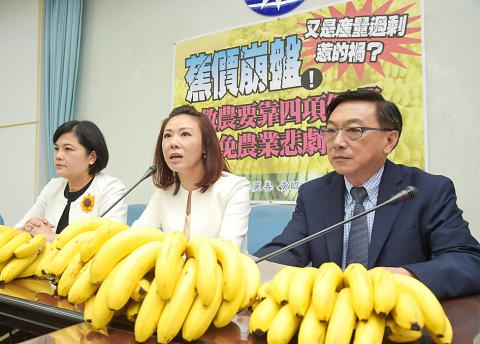Chinese Nationalist Party (KMT) lawmakers yesterday said the Council of Agriculture (COA) was to blame for a slump in banana prices, as it failed to curb overproduction this season.
The KMT lawmakers said good weather with copious precipitation and without major storm damage this year meant a bountiful harvest in most fruit producing regions in the nation, which has led to a banana glut.
“The banana glut has brought about the price collapse. Prices have fallen to less than NT$10 per kilogram, which is the production cost for farmers. Wholesalers have even paid NT$5 per kilogram for higher-quality bananas and NT$2 per kilogram for subpar bananas in producing regions,” KMT Legislator Chang Li-shan (張麗善) said.

Photo: Huang Yao-cheng, Taipei Times
“As the retail price is less than the cost of producing the bananas, some farmers have not harvested their crops. They have allowed the bananas to ripen and rot on the plant. Farmers have suffered from the price collapse, but the council has not created a policy to deal with situation. It has done nothing about it,” Chang said.
Taiwan’s fruit harvest is year-round, retailers said.
The spring banana crop runs from March to May in Kaohsiung and Pingtung County and the summer banana crop is from June to September in Chiayi County and other parts of the south, while the winter banana crop is from October to February in central Taiwan, they added.
The glut has been driven by high demand and high prices for bananas last year due to major damage by typhoons and other factors that reduced production capacity, retailers said, adding that the shortage meant farmers planted more bananas and other fruits to take advantage of the high prices.
Council statistics showed that the nation’s annual domestic banana consumption averages 280,000 tonnes, but this year’s over-production means that farmers expected to harvest 350,000 tonnes.
Council officials have been negligent for not controlling banana production by limiting land allocation and not setting up a base price for bananas to prevent financial losses for farmers, Chang said.
Bananas last year cost at least NT$50 per kilogram, KMT Legislator Arthur Chen (陳宜民) said.
“Council officials have failed to give farmers proper guidance when planting crops and should have better planned for the over-supply. They should also establish a mechanism to adjust for fluctuations in fruit prices,” Chen said.
KMT Legislator Lee Yen-hsiu (李彥秀), Chang and Chen demanded that the council rescue farmers from their financial dilemma through a four-point plan: Impose controls on seedlings to limit the allocation of land for bananas; ensure farmers register their plantations; improve assistance to farmers to plant other fruits and crops; and set up minimum retail prices for bananas.
They called for Minister of Agriculture Lin Tsung-hsien (林聰賢) to resign over his failure to deal with the banana glut and price collapse, along with other food safety issues over the past few months.

Alain Robert, known as the "French Spider-Man," praised Alex Honnold as exceptionally well-prepared after the US climber completed a free solo ascent of Taipei 101 yesterday. Robert said Honnold's ascent of the 508m-tall skyscraper in just more than one-and-a-half hours without using safety ropes or equipment was a remarkable achievement. "This is my life," he said in an interview conducted in French, adding that he liked the feeling of being "on the edge of danger." The 63-year-old Frenchman climbed Taipei 101 using ropes in December 2004, taking about four hours to reach the top. On a one-to-10 scale of difficulty, Robert said Taipei 101

Nipah virus infection is to be officially listed as a category 5 notifiable infectious disease in Taiwan in March, while clinical treatment guidelines are being formulated, the Centers for Disease Control (CDC) said yesterday. With Nipah infections being reported in other countries and considering its relatively high fatality rate, the centers on Jan. 16 announced that it would be listed as a notifiable infectious disease to bolster the nation’s systematic early warning system and increase public awareness, the CDC said. Bangladesh reported four fatal cases last year in separate districts, with three linked to raw date palm sap consumption, CDC Epidemic Intelligence

Taiwanese and US defense groups are collaborating to introduce deployable, semi-autonomous manufacturing systems for drones and components in a boost to the nation’s supply chain resilience. Taiwan’s G-Tech Optroelectronics Corp subsidiary GTOC and the US’ Aerkomm Inc on Friday announced an agreement with fellow US-based Firestorm Lab to adopt the latter’s xCell, a technology featuring 3D printers fitted in 6.1m container units. The systems enable aerial platforms and parts to be produced in high volumes from dispersed nodes capable of rapid redeployment, to minimize the risk of enemy strikes and to meet field requirements, they said. Firestorm chief technology officer Ian Muceus said

MORE FALL: An investigation into one of Xi’s key cronies, part of a broader ‘anti-corruption’ drive, indicates that he might have a deep distrust in the military, an expert said China’s latest military purge underscores systemic risks in its shift from collective leadership to sole rule under Chinese President Xi Jinping (習近平), and could disrupt its chain of command and military capabilities, a national security official said yesterday. If decisionmaking within the Chinese Communist Party has become “irrational” under one-man rule, the Taiwan Strait and the regional situation must be approached with extreme caution, given unforeseen risks, they added. The anonymous official made the remarks as China’s Central Military Commission Vice Chairman Zhang Youxia (張又俠) and Joint Staff Department Chief of Staff Liu Zhenli (劉振立) were reportedly being investigated for suspected “serious